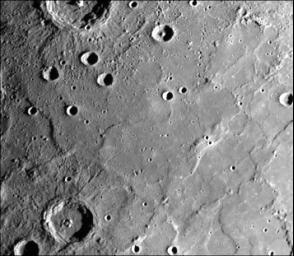
|
Young Craters on Smooth Plains
- Click the image above for a larger view
- Full-Res JPEG (356 x 311) (28.4 kB)
- Full-Res TIFF (356 x 311) (117.0 kB)
Caption:
Young craters (the largest of which is about 100 kilometers in diameter) superposed on smooth plains. Larger young craters have central peaks, flat floors, terraced walls, radial ejecta deposits, and surrounding fields of secondary craters. Smooth plains have well-developed ridges extending NW and NE. This image (FDS 167), acquired during the spacecraft's first encounter with Mercury, is located approximately 60 degrees N, 175 degrees W.
Background Info:
The Mariner 10 mission, managed by the Jet Propulsion Laboratory for NASA's Office of Space Science, explored Venus in February 1974 on the way to three encounters with Mercury-in March and September 1974 and in March 1975. The spacecraft took more than 7,000 photos of Mercury, Venus, the Earth and the Moon.
Cataloging Keywords:
| Name | Value | Additional Values |
|---|---|---|
| Target | Mercury | |
| System | ||
| Target Type | Planet | |
| Mission | Mariner | |
| Instrument Host | Mariner 10 | |
| Host Type | Flyby Spacecraft | |
| Instrument | ||
| Detector | ||
| Extra Keywords | Crater, Grayscale, Moon | |
| Acquisition Date | ||
| Release Date | 2000-01-15 | |
| Date in Caption | ||
| Image Credit | NASA/JPL/Northwestern University | |
| Source | photojournal.jpl.nasa.gov/catalog/PIA02425 | |
| Identifier | PIA02425 | |
